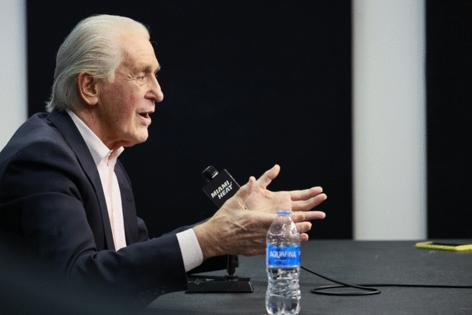Ira Winderman: For Heat, NBA's new CBA means complicated business ahead
Published in Basketball
MIAMI — We’re not sure if Pat Riley still cruises Biscayne Boulevard top down in one of his classic convertibles. But a case could be made for this being a test drive of an offseason for the Miami Heat.
While the current NBA collective-bargaining agreement went into effect on July 1, 2023, only now are the long-term ramifications of the terms fully coming into play.
It is why the Boston Celtics likely would still have sold off Jrue Holiday and Kristaps Porzingis even if Jayson Tatum did not go down in the playoffs with his Achilles tear.
The chilling effects of the second apron in this latest CBA have changed the notion of a Big Three to something even less than two-and-a-half men, as Jaylen Brown and Derrick White now play on for the Celtics.
It is why teams in win-now mode nonetheless have been shedding salary, as the Memphis Grizzlies did with Desmond Bane and even Cole Anthony.
The highly punitive repeater tax no longer makes the hoarding of talent cost-effective.
It is why teams desperately in need of free-agency makeovers had to settle for what in other years would have been considered leftovers. With players now opting for the comfort of extensions and using the early-signing period in June to re-up with current teams, there simply is not much to covet on the free-agent market.
So the Los Angeles Lakers, in desperate need of quality depth to contend in the brutal Western Conference, are left to sate their free-agency desires with the middling likes of Deandre Ayton and Marcus Smart.
It is why, as you scour all you want, you won’t find any bonuses in the few new contracts that have been created this offseason.
Not with bonuses deemed “unlikely” now counting against the luxury-tax aprons.
Even with February’s trade of Jimmy Butler, this never set up as a makeover offseason for the Heat, not after taking back similar salary in that transaction.
But there was a time this past season when the Summer of 2026 could have been transformative.
At one stage this past season, that’s when the Heat were positioned with potential 2026 expiring contracts of Butler, Terry Rozier and others on the roster.
Now it looks as if the Heat have come to the leaguewide realization that free agency is arguably a less significant repurposing period than the midseason NBA trading deadline and even the late-June period ahead of the NBA draft.
In taking back Andrew Wiggins in the Butler trade, the Heat well still could have Wiggins’ 2026-27 $30.2 million player option on their books next season.
In re-upping with Davion Mitchell ahead of free agency, there now is Mitchell money on the books next summer
And in re-upping instantly with Bam Adebayo when his last two extension windows opened, there was a long view taken in regards to keeping what you have rather than risking the unknown possibilities behind Door No. 2.
Next up could be extensions with Nikola Jovic (eligible now) and Tyler Herro (eligible starting Oct. 1). Lock into those deals, and future upcoming free-agency windows would be further compromised.
In fact, the only givens when it comes to Heat extensions is that bonuses will become a Heat thing of the past. When Herro’s current extension was written, there was no accounting penalty for bonuses deemed as “unlikely.”
So the Heat basically told Herro to have a party when it came to potential unlikely bonuses, including one for being named NBA Most Valuable Player and one for being named NBA Defensive Player of the Year (no, really). Now all $2.5 million of those potential but unlikely annual Herro bonuses count each year against the tax aprons, whether realized or not.
It is with the new elements of the CBA that the Heat moved ahead with the new deal with Mitchell ahead of free agency, one that locks in a rotation player at less than the mid-level exception. It is what you do these days, rather than wait for the unknowns of free agencies ahead. It is why Norman Powell could yet wind up being extended before his scheduled free agency next summer, making the Heat’s Summer of 2026 even less dramatic.
In a different world, during a different CBA, the Heat might have played it out with Duncan Robinson’s contract, might have solely sought expiring money in a Butler trade, might have cast another luxury-tax season to the wind and filled their vacant 15th and final standard roster spot with a player acquired with exception money.
This no longer is that time.
A Big Three likely never again will be walking through that 601 Biscayne door.
Free-agency shopping will be replaced by prudent trade investments.
Draft picks will have to be prioritized and maximized.
The machinations in February (the Butler trade), in June (keeping the No. 20 pick to draft Kasparas Jakucionis and re-signing Mitchell ahead of free agency) and the loss accepted in July (the trade of Robinson) are part of a new NBA world order.
Pat Riley still has Micky Arison’s money to spend.
The Heat still have Andy Elisburg to maximize the cap, and Adam Simon to maximize the draft.
But they may never again have NBA free agency as they once knew it.
Not amid this new CBA, a truly complicated basketball agenda.
©2025 South Florida Sun-Sentinel. Visit sun-sentinel.com. Distributed by Tribune Content Agency, LLC.







Comments